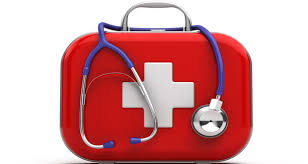
Checking life jackets, VHF radio, and flares before setting out for a day on the water should be a standard part of your predeparture checklist. But your first-aid kit is likely stowed and forgotten — as it seems you rarely need it. If setting out for just a few hours, most boaters assume they're unlikely to suffer a medical emergency. Or they reason that they're not going far and can quickly get back to the dock, so why worry? But having basic supplies at the ready could save you a trip to the emergency room — or even a life.
Essential Items For Your First-Aid Kit
- Scissors — to cut bandages, surgical tape, and clothing away from a wound if removing the garment is impossible
- Safety Pins — to hold bandages or slings in place
- Tweezers — to remove ticks, splinters, and other small foreign bodies embedded in the skin
- Syringe (without needle) — to fill with saline and flush dirt from a wound, or as an emergency eye-wash pump
- Saline Solution — to flush wounds prior to applying bandages
- Fabric Tape — to hold dressings and bandages in place
- Elastic Bandages — provide both covering and support to injuries
- Triangular Bandage — to support and immobilize a damaged arm or shoulder
- Large Adhesive Pads — to cover larger cuts and wounds
- Instant Cold Pack — temporary relief from minor burns and swelling from sprains and strains
- Foil Space Blanket — reduces shock by retaining body heat
- Disposable Gloves — to wear during contact with bodily fluids — yours or anyone else's. some people are allergic to latex, so stock nitrile gloves
- Sterile Absorbent Pads — to cover wounds and abrasions
- Rolled Gauze — to cover wounds where an adhesive bandage is too small or extra absorbency is required
- Adhesive Bandages — keep a selection from small to large. include round ones, and butterfly bandages to effectively close a deeper cut
- Burn Cream — treats sunburn or galley burns. Note: treat a significant burn as a medical emergency
- Individually Wrapped Common Medications — for treating stings, heartburn, seasickness, diarrhea, and so on
- Alcohol Wipes — to sterilize hands, clean scissors and tweezers before/after use, or to gently clean a wound
- Storage Container — keeps everything organized and easily accessible
- First-Aid Guide — essential reference. read it before you need to use your first-aid kit
- Aspirin — if you suspect a heart attack
- Ibuprofen — general pain reliever
- Acetaminophen — general pain reliever for those who can't take aspirin or ibuprofen
- Cotton Swabs — to clean delicate areas before applying a dressing
- Sam Splint — to immobilize a suspected fractured limb
- Antiseptic Ointment Or Spray — apply to minor scrapes and abrasions to prevent infection
- Eye Wash — for flushing chemicals, fuel, dirt, and grit out of the eye. can offer relief in cases of severe pollen allergies